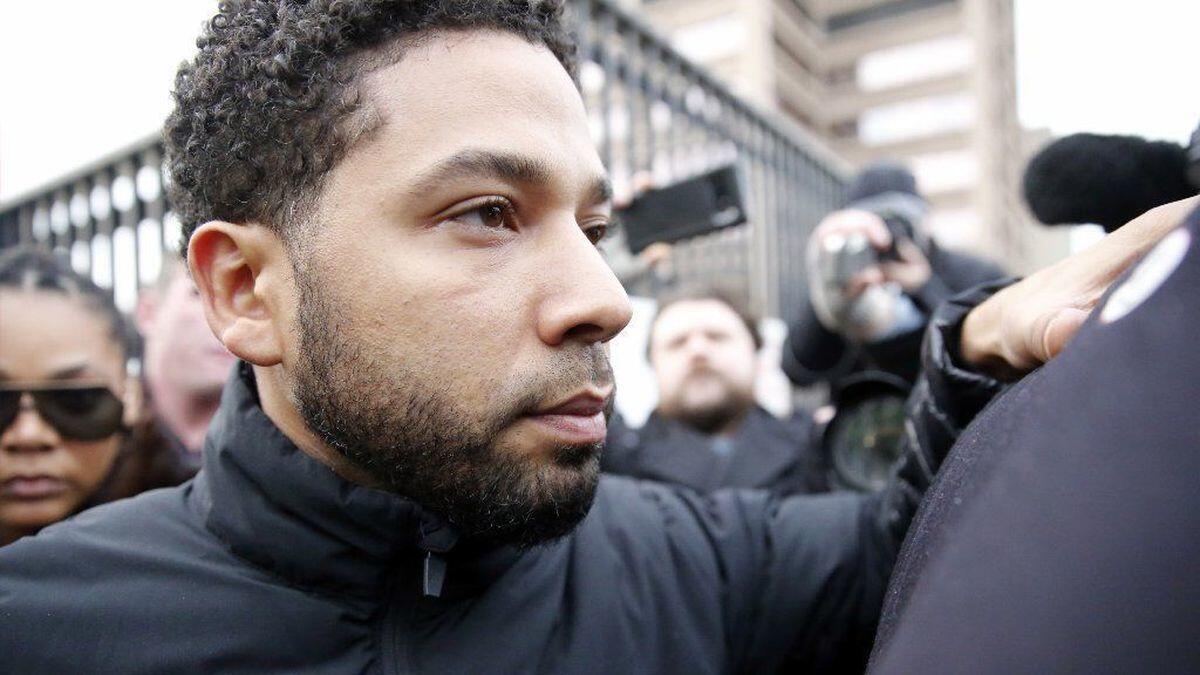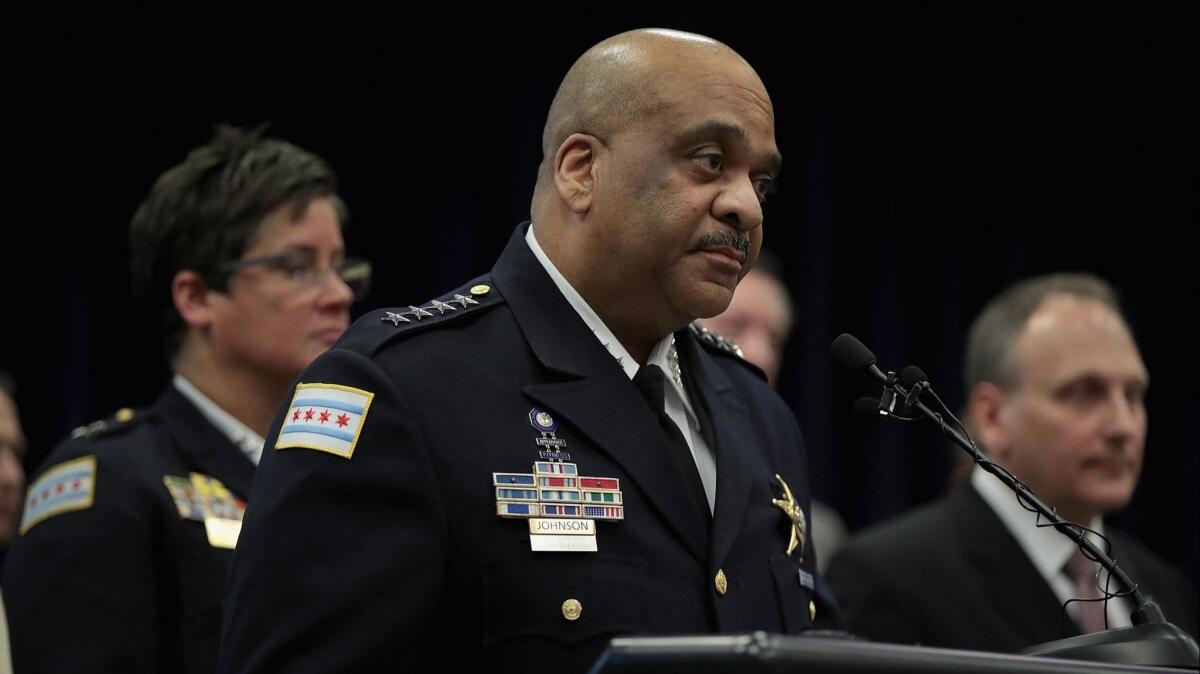For victims of hate crimes, Jussie Smollett case is a giant betrayal

- Share via
The dramatic unraveling of the story of a vicious attack on actor Jussie Smollett has spread deep concern among hate-crime victims that growing racist and anti-gay violence now may be more likely to go unreported and unpunished.
Last week, Chicago police arrested Smollett, the black, openly gay star of Fox television’s “Empire,” and charged him with orchestrating a fake encounter on a Chicago street with two men whom he alleged had assaulted him, hung a rope around his neck, and hurled homophobic and racist slurs while shouting, “This is MAGA country.”
Smollett, whose bold on-screen and public persona had made him an aspirational model for many young gay African Americans, is out on bail and maintains his innocence.
But as doubts have grown about his harrowing account, some gay Americans and racial minorities wonder whether their groups, already disproportionately targeted as victims, will have more trouble gaining the trust of law enforcement and the empathy and support of the public.
Jussie Smollett’s path from adorable child actor to ‘Empire’ star to felony suspect »
Peter Dunn, a 32-year-old writer and director in New York City, said the Smollett saga reminded him of an incident a dozen years ago in Ireland when he and his boyfriend were taunted and harassed by a group of white men as they walked on a Dublin street.
“I’ve never seen a black faggot before,” one shouted at Dunn, who is gay and black. The assailants then set upon Dunn, punching him and hitting him with a glass bottle. The couple fought off the attackers and police took the incident seriously, Dunn said, but he was left shaken for weeks.
Now he worries whether the fallout over Smollett’s case will accelerate distrust between police and victims, which historically has been a hurdle in reporting and investigating violent crimes triggered by racism, homophobia and other forms of discrimination.
“To have someone completely fabricate something like that is so disrespectful and terrifying for what is already a hard enough daily life as a black gay man,” Dunn said. “This will take us so many steps backward.”
From the instant it was reported, Smollett’s case was exacerbated by current tensions in American society: bitter divisions over Donald Trump’s presidency and policies; the growing specter of white supremacist violence and Civil War-era rhetoric; criticism of a hair-trigger media culture that acts as judge, jury and executioner in the court of public opinion.
Following the actor’s arrest Thursday, victims’ advocates said there’s another source of societal division that can be added to that list.
“There’s a concern that now police, instead of saying, ‘Let me investigate,’ they’ll say, ‘Hmm, I wonder if this is like the Smollett investigation?’” said Richard Cohen, president of the Montgomery, Ala.-based Southern Poverty Law Center, which tracks hate groups and incidents. “Victims of any crime shouldn’t be viewed with suspicion and that’s what you worry about as a result of the Smollett case.”
At least one lawmaker already has pounced on the Smollett case to push legislation punishing hate-crime victims who cry wolf. Last week, Minnesota state Rep. Nick Zerwas announced that he will introduce a bill to increase the penalty to $3,000 and up to one year in jail for falsely reporting a hate crime.
In fact, false hate crime reports are exceedingly rare, and the number of hate crimes is rising. The federal government estimates that more than 250,000 hate crimes are committed every year. Only a fraction of those are reported to police, and a smaller sliver are submitted for logging to the FBI, which releases an annual count of hate crimes based on data voluntarily supplied by local law enforcement agencies.
In its most recent report, the bureau counted 7,175 hate crimes in 2017, a 17% increase from the prior year that was fueled by a rise in attacks against racial and religious minorities. The number represented the third consecutive year that hate crimes had gone up and the biggest year-by-year increase in hate crimes since 2001. In California, hate crimes grew by more than 17% since 2017 to 1,095, while Los Angeles showed a 16% increase to 263.
As with the nation overall, race-driven incidents were the most common form of hate crime in California, with black people being the most frequently targeted. Attacks against a person’s sexual orientation were the third-most-reported nationally and came in second in the state. In California and several other states, black people were also disproportionately targets of anti-LGBTQ incidents.
Brian Levin, director of the Center for the Study of Hate and Extremism at Cal State San Bernardino, said he has counted just 48 cases nationally of false hate crime reports over the last three years. That’s 0.3% of all hate crimes reported.
Many cities are not “meaningfully participating” in reporting hate crime data, he said, adding that “we have a far greater problem with under-reporting” than false reporting. Of the more than 16,000 law enforcement agencies in the country, at least 14,000 did not report data to the FBI last year, or told the bureau that there were no hate crimes in their jurisdictions.
In 2017, the city of Miami reported no hate crimes and Miami-Dade County reported one. Of 28 law enforcement agencies the FBI requested numbers from in Mississippi, just one reported any crimes at all and cited only one incident. Charlottesville, Va., which in 2017 was the site of one of the largest hate-group gatherings in recent decades — a white supremacist rally at which a counter-protester was killed — reported only one hate crime that year.
Also, several states — Indiana, Arkansas, Georgia, South Carolina and Wyoming — do not have hate-crime laws on their books that increase criminal punishment if a judge or jury determines that prejudice played a role in a perpetrator’s actions. California was the first state to pass a hate-crime law, in 1984.
Still, many victims’ rights advocates and civil rights groups — several of which quickly put out statements supporting Smollett when he first reported his alleged attack — have struggled in recent days with how to ensure that one high-profile case doesn’t derail years of pushing for hate-crime laws, fighting for resources for victims and urging police to investigate such attacks.
The confusion over the Smollett case “must not overshadow the alarming increase of hate crimes we’ve seen in recent years,” said George Selim, senior vice president of programs at the Anti-Defamation League.
“For every case like this, there are literally tens of thousands of others that are very real that leave a lasting impact,” said Selim, who agreed that it’s possible that the Smollett case could have a chilling effect on the reporting of hate and bias-based crimes.
“Right now it’s too early to know if this will have an empirical effect. I sure hope it doesn’t.”

It’s a fear shared by Chicago police. At a news conference Thursday, Chicago Police Superintendent Eddie T. Johnson winced and fumed as he described the police investigation into the alleged hoax as a serious setback for crime victims.
“Bogus police reports cause real harm,” Johnson said. “They do harm to every legitimate victim who is in need of support by police and investigators as well as the citizens of this city. My concern is that hate crimes will now be met publicly with a level of skepticism that previously didn’t happen.”
That’s how Balmeet Singh sees it too. Singh said that in 2016 he was standing outside a burger shop in a strip mall when a stranger squared up against him.
“So, you’re going to blow up this country?” the man said to Singh, a 33-year-old Bakersfield real estate agent who follows the Sikh religion. “You’re trying to blow up this country?”
Singh said the man then threw a drink in his face, his long beard and burgundy turban the intended target. Then the man threatened to kill him, he said.
A dozen people sat in the nearby restaurant patio. Singh said he scanned their faces. No one said a word.
“I spoke to people even within my community, and even they said, ‘Oh, maybe you said something, maybe you did something, maybe there was a misunderstanding, maybe he was just a crazy person,’” he recalled.
He reported the incident to the police, who were able to track down the man.
Singh said that when he saw news of the alleged attack against Smollett, he recalled thinking about how hate-fueled violence is “an equalizer” that terrorizes and oppresses its victims across ethnic, class and gender lines.
“Things like race trump socioeconomic status,” Singh said, referring to how he related to Smollett as a racial minority even if the actor was much wealthier than him.
But now Singh said he worries that people like him may be targeted in the future.
“What happened is hurtful to anyone who has experienced a real hate crime,” he said. “Now there is this extra layer of scrutiny. I experienced this first-hand.”
As the Smollett investigation continues, Singh fears the repercussions of the case will go beyond a single celebrity.
“People will hesitate to report things as well for fear of not being taken seriously,” he said. “There is a big sense of betrayal.”
More to Read
Sign up for Essential California
The most important California stories and recommendations in your inbox every morning.
You may occasionally receive promotional content from the Los Angeles Times.
















